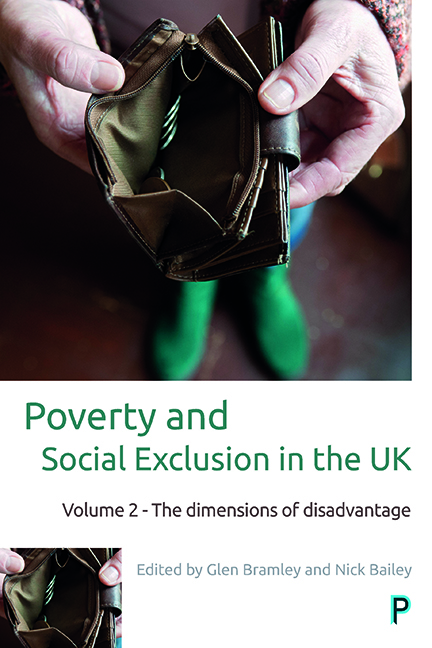six - Employment, poverty and social exclusion
Published online by Cambridge University Press: 12 April 2022
Summary
Introduction
Paid work is, quite rightly, at the heart of many governments’ responses to poverty and social exclusion. Most directly, paid work is a source of income which can reduce risks of poverty and raise living standards, both in the short and longer term, including in retirement. In addition, it is also seen as having a wider ‘transformative potential’ (Patrick, 2012). It can provide people with a social role and hence a source of identify and self-respect, as well as opening up opportunities for social contact, reducing risks of isolation. All of these can in turn have positive effects on health and well-being; for those suffering health problems, work can have a restorative potential (Waddell and Burton, 2006). As a result, some perspectives on social exclusion have come to equate employment with inclusion: to be in paid work is to be regarded as ‘included’ (Levitas, 1998).
Yet as many critics have observed, the benefits of employment have been growing more unequal in recent decades as the labour market has undergone a series of fundamental changes. These changes have been driven in part by technological developments which have reduced the value of some kinds of skills, while enhancing the value of others (Machin, 2011). At the same time, globalisation of the economy has meant increased competition for developed countries from lower-cost regions. However, the changes are also driven by conscious policy choices, notably in relation to labour markets and welfare.
Labour markets have been ‘deregulated’ to make it easier for businesses to determine the conditions under which they hire labour, while the balance between workers and employers has been further shifted by restrictions on trades unions (Dickens et al, 2003). The consequence has been the rise of ‘flexible’ forms of work involving variable and/or anti-social hours as well as widening inequality in rates of pay (Machin, 2011). The UK has some of the lowest levels of employment protection of any of the OECD countries (Venn, 2009).
Welfare systems have shifted from a safety-net function to become tools for ‘activation’ or for encouraging re-entry to employment for the unemployed and inactive (Gilbert and Besharov, 2011). Unemployment benefits have been reduced in value and hedged around with an increasing number of conditions or requirements, enforced through tough sanction regimes.
- Type
- Chapter
- Information
- Poverty and Social Exclusion in the UK Vol 2The dimensions of disadvantage, pp. 159 - 178Publisher: Bristol University PressPrint publication year: 2017
- 1
- Cited by



